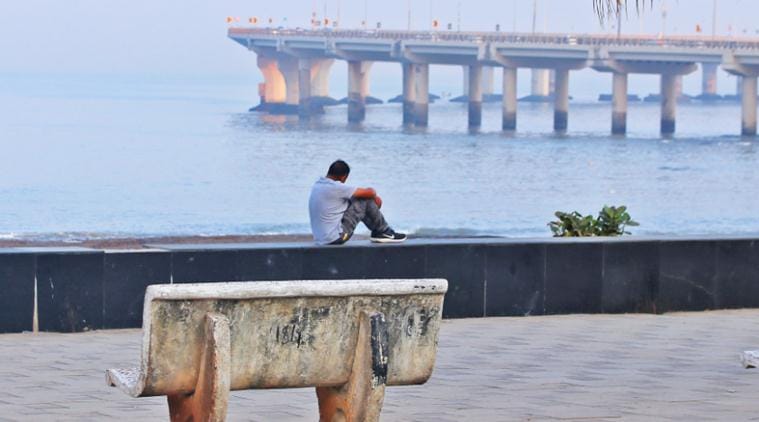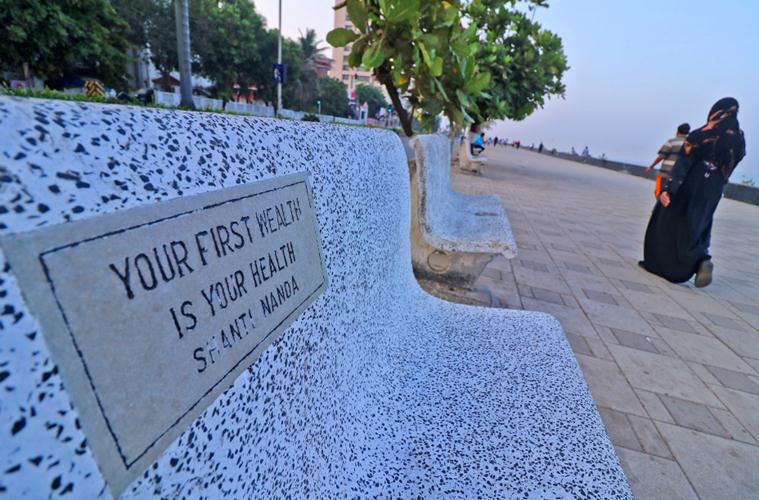
The baking sun and salty breeze may have peeled away the paint and left only pale-white imprints on the marble plaques, but tear yourself away from staring out into the sea at Mumbai’s Worli promenade and you’ll find that the crusted benches that line the walkway don’t just provide a moment’s rest, but also record the lives of people who have pounded that pavement over the decades.
As the Brihanmumbai Municipal Corporation (BMC) began construction on the Coastal Road — an ambitious network of roads that the municipal corporation hopes will decongest the city’s choked north-south connectors — in November last year, regular walkers have a reason to worry as the benches are likely to be broken. Local residents have opposed the BMC’s plan to take over the promenade and replace it with a longer and wider one once the coastal road is complete.
While the seating spaces in public areas have been sponsored by charities and local politicians, the benches on the Seaface at Khan Abdul Gaffar Khan Road are donated mostly by families in memory of loved ones for whom a day was incomplete without a walk by the sea.
The two-and-a-half kilometre walkway has had benches in a variety of materials dating back over 50 years, when the first concerted efforts were made at providing facilities for walkers. Each time the BMC carried out renovations and relaid the surface though, the benches were broken and covered in debris. That was until 2013, when Dr Neelam Nijhara, secretary of Worli Seaface Forum, began a neighbourhood drive to get back the benches. “People had been telling me that they needed places to rest while on their walks and that it would be nice to have some benches,” she says.
Dr Nijhara recalls that her proposal was well-recieved by the BMC. The municipal body’s own wood-and- metal benches were ripped apart by vandals. The Forum decided to install durable reinforced benches. Locals, who were persuaded to loosen their purse strings for the beautification drive, also got the chance to dedicate their contribution to whomsoever they pleased. To encourage donors, her husband Prakash Nijhara had benches built to remember his deceased parents. Most donors inscribed messages for their departed family members with deep-rooted ties to the Seaface.
People like the Chaudhari family had made Worli Hill Road their home for 35 years before shifting out in 2009. The patriarch, late Pritamdayal Chaudhari, barrelled down the promenade at dawn every day, dressed in all whites — shirt, shorts, socks, shoes — and white hair.

“In 1990, he suffered a heart attack. That led him to change his lifestyle. He weighed more than 100 kg at the time and became determined to lose weight,” says his wife, Pravina Chaudhari, 65, who now lives in Andheri West. The hotelier began his walks at 5.30 am, steadily picking up a brisk pace, and returning only in the evenings. “He became known for his brisk walk. In six months, he lost 35 kg by walking 20 km a day. Even after meeting his fitness goals, he never gave up on his walk and coupled it with a healthy diet,” she adds.
In 1997, even after a second heart attack, he was back on his feet after undergoing bypass surgery. Six years later though, a brain haemorrhage partially paralysed him and severely affected his mobility. When he passed away in 2014 aged 76, his family could think of no better way to remember him by. “We donated four wood benches to the garden where his laughter club met and put up eight benches on the promenade,” she says. The plaque reads: “In loving memory of Shri Pritamdayal Chaudhari. Hari Om.” “That was his word for hello, bye, good morning and good night. It was his greeting and salutation for everyone,” says his daughter Pooja Chaudhari, 40, an entrepreneur. The family rues the loss of six of its benches installed opposite Worli Dairy when the BMC barricaded part of the promenade to start construction.
“I don’t know what will happen to the benches once the construction begins in full swing. The 140 odd benches will have to be broken,” says Dr Nijhara.
The BMC’s Coastal Road Project has led to surfacing of a series of posters people can read while on a stroll on the Seaface. Joining detailed diagrams of the project are appeals by the Shiv Sena — which controls the BMC — not to believe “rumours” that the Seaface will be a casualty to development, and posters proclaiming an SOS issued by the Nationalist Congress Party’s ex-MLA, Sachin Ahir, to save the stretch in his constituency.
Down on the benches, the Worli Walkers Association wants you to “watch the waves a wee bit,” the children of Sham and Pushpa Navani thank them for being loving and odes to Shanti Nanda and Ravi Nanda read, “Your first wealth is your health” and “Self-improvement is a never-ending task,” respectively.
Wider developmental concerns do not bother Nikhil Desai, who lives on the northern end of the Seaface. The indignation of the 69-year-old, who runs a business in Fort importing paper, is aimed at the dismal state of some Seaface benches. “They are so dirty that you don’t even feel like sitting on them,” he snaps. Grateful to Dr Nijhara for getting the benches installed, he feels that donors must be made responsible for their upkeep.
Desai’s own bench lies across the street from Vijay Villa Apartments, not far from the junction where RG Thadani Marg joins Khan Road and the site of his daily encounter with the promenade’s beloved juice-wallah. Desai was always the first customer at Harish Mehta’s car, from where the latter sold vegetables, fruits and spice mixes. “Harishbhai stayed in Andheri West and woke up at 2.30 am to make juices. He would pack them in two large bags, load them in his car and reach Worli at 6 am,” recalls Desai.
Glasses of juice sold between Rs 10 and Rs 15. “Harishbhai’s motive was never profit but just to make enough money to cover fuel costs. Above all, he wanted to make sure that walkers had nutritious juice,” Desai says. When his customers read Mehta’s obituary in a newspaper six years ago, their thoughts turned to installing a bench to mark his parking space. “Two days before he died, Harishbhai had said that he was feeling better and would return soon,” says Desai.
The benches dotting the Seaface are crafted at Royal Potteries in the suburb of Naigaon, nearly 70 km away, while the marble plaques are outsourced to another firm. Imran Siddiqui, the proprietor of Royal Potteries, says that RCC is the material best suited to an area open to the elements. “Before building the benches, I had taken a look at the wood and fibre benches that the BMC had installed, but they were falling apart.” Siddiqui says that the cost of making a bench is now Rs 3,500, inclusive of a 6×12 inches marble plaque, and Rs 200 extra in case the message is a little long.
Running over falling foul was never difficult for 85-year-old paediatrician Dr RK Anand and his septuagenarian wife Asha, a former nurse. The couple, whose apartment in a leafy Worli lane overlooks the sea, donated a bench in 2013 after seeing friends do so. “My older brother, Ram Nath Anand, has had a very big role to play in who I am today,” Dr Anand says.
As a young Doctor of Medicine (MD) in Amritsar, his plans to study abroad were initially scuppered by an older brother keen to have him join his surgical instruments supply business in Patna. That changed when the older Anand visited a sick relative at AIIMS in Delhi. “Bhaisahab was so impressed with the doctors there that he urged me go to the UK,” says Dr Anand.
Having completed his advanced studies in paediatrics in UK and worked at Children’s Hospital in Cardiff (Wales, UK) Dr Anand, who now runs his clinic at Charni Road in Mumbai, examines infants five days a week. When it came to composing the message for the bench, Dr Anand distilled the message down to “Smile; Let Go. Ram Nath Anand. Patna.” “When Asha and I go out for morning walks, we sit on that bench some times. I feel then that I am receiving my brother’s blessings!” he says.
This article appeared in print with the headline ‘On the bench, by the sea’